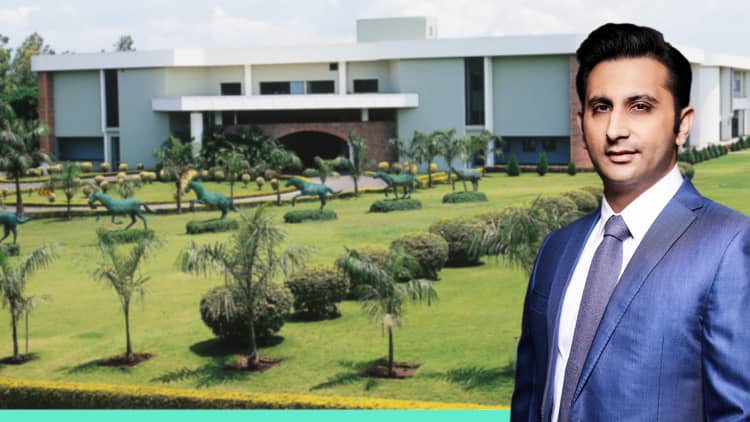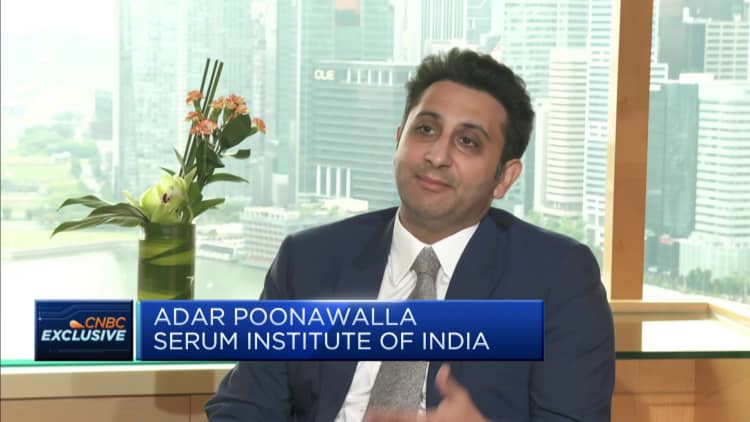Adar Poonawalla became the CEO of the world’s largest vaccine maker, the Serum Institute of India, when he was 30 years old.
| Bloomberg | Getty Images
Adar Poonawalla became the CEO of the world’s largest vaccine maker, the Serum Institute of India, when he was 30 years old.
But that wasn’t his first foray into the family business.
“I started, you know, at the grassroots level. I worked in every department, and especially marketing, sales and exports, because I wanted to build exports,” the current 41-year-old CEO explained.
The company has come a long way since he took over in 2011.
Today it is the largest vaccine manufacturer in the world, by number of doses produced and sold globally. According to the company, it “provides the world’s cheapest and WHO-accredited vaccines to as many as 170 countries.”
Adar led the company at the height of the global pandemic. During that time, the Serum Institute ramped up its production of Covid vaccines to meet global demand and began manufacturing Covishield in India, a vaccine developed jointly by AstraZeneca and the University of Oxford, which is produced domestically.

According to the Indian health ministry, Covishield accounts for almost 80% of the total vaccines administered in India to date.
“We’ve invested about $2 billion over the past two years,” Adar said, adding that the completed pandemic facility “doubled our capacity.”
“We produced 1.9 billion doses in 2021 alone, after committing just one billion doses, so we made double what we committed.”
They are now capable of producing 4 billion doses of various vaccines in the new facility, according to Adar.
The man behind
It was Adar’s father, Cyrus Poonawalla, who founded the Serum Institute of India in 1966, against the backdrop of a country awash in imported life-saving vaccines. However, the high cost of the drugs made them virtually inaccessible to the majority of the Indian population.
Cyrus never fancied himself in the pharmaceutical industry – in fact, he was a horse breeder who inherited his family’s racehorse ranch.
But he soon learned that horse serum was a vital ingredient in many vaccines and that many of his farm’s retired horses had been donated to the state-owned Haffkine Institute for vaccine production.
At the same time, Cyrus achieved immunization rates have remained low in India, partly due to high prices of imported vaccines.
In 1966, at the age of 25, Elder Poonawalla embarked on a journey to establish the Serum Institute of India.
The company’s first product was the tetanus vaccine in 1967.
A new generation
Following in his father’s footsteps, Adar is still working on the company’s early aspirations of producing affordable vaccines.
“We could have charged higher prices. But we didn’t,” he told CNBC Make It. “We didn’t want to take advantage of it beyond the point. We just wanted to make a product that was accessible and affordable.”
Leveraging their economies of scale to minimize costs, his company has now become the largest vaccine maker in the world, with around 65% of children globally given a vaccine from the Serum Institute of India, according to the company.

Through time and experience, Adar has been able to understand and predict global trends and demand, which has made him even more determined to ensure sufficient supply. It was this forward planning that contributed to Serum’s success and active engagement during the pandemic.
Thanks to his foresight, that decision “has also come in really handy during the Covid crisis” and the company has “extra capacity”.
Adar’s extensive travels also meant that he met people from different places and could “understand where global demand was going”.
This knowledge was a driving factor that encouraged him to build sufficient capacity to ensure the company was able to produce enough to meet growing global demand.
Bumpy road ahead
However, success hasn’t been easy.
Setting up the company was a “huge obstacle” for his father in the 1970s, who needed to get permits and licenses, Adar said.
Acquiring enough capital to start the business also proved a challenge for Cyrus, which “had no background, no brand name,” he explained.
Vaccine manufacturing at the Serum Institute of India Pharmaceutical Facility in Pune, Maharashtra, India. Like the rest of the world, the vaccine maker is currently moving away from its heavy focus on Covid-19 vaccines and moving to expand its product portfolio.
Bloomberg | Bloomberg | Getty Images
Shortly after joining the company, Adar was determined to increase production volume when he realized that the company was always missing out on “new opportunities”.
This awareness made it “very obvious and very easy” for him to invest in capabilities, Adar told CNBC Make It.
With the growing urgency for Covid vaccines around the world as the pandemic spread, Adar was determined to make realistic promises to meet the demand for vaccines.
“You can do billions of doses if you’re given a year or two, but doing it in three to four months — that’s what the world really needed” — this is where managing those expectations was key, Adar stressed. .
The next chapter
Like the rest of the world, the Serum Institute of India is moving away from its heavy reliance on Covid-19 vaccines and is now shifting its focus to expanding its product portfolio.
As the company develops, Adar said it is looking to enter new markets.
“I’m looking to further expand my vaccine portfolio in Europe and the US.”

Meanwhile, the CEO said he remains hopeful the world can be better prepared for future pandemics if there are measures implemented now.
“We know what we have to do,” he explained. “But are we doing that is the question I think leaders will need to look at.”
Adar said he remains excited to serve other low-income countries like the African continent and Asia to provide them with affordable access to life-saving vaccinations.
“I am frankly quite relieved that the Covid pandemic is nearing its end, as I can go back to my vaccines in my pipeline that I had been developing for the last few years,” Adar said.
“I just want to get back to that. And I can’t wait.”
Not to be missed: How two teenagers built an app worth $900 million: Zepto founders share three tips
Do you like this story? Subscribe to CNBC Do it on YouTube!